An Asian megacity partially locked down because of pollution. Acres of farms in Africa destroyed by extreme weather. Ancient Arctic cultures disappearing with melting ice.
This isnt the future. Its happening now.
I have a lot of problems with coughing as soon as I go out of the room, says Mukesh Khare, professor emeritus at the Indian Institute of Technology Delhi. In November 2021 authorities in New Delhi closed schools, temporarily banned construction activities and advised people to work from home. A response to choking smog.
In Africa, extreme weather has become far more common than it once was, from blistering heat and drought to erratic, torrential rainfall and the devastating floods that ensue, says Dr Catherine Nakalembe at the University of Maryland, in the US. These extreme 1-in-30-year events have become one-in-every-three-year events. People dont have time to adjust.
And in the cultural region of Spmi, which stretches across parts of Norway, Sweden, Finland and Russia, Saami reindeer herders have told postdoctoral researcher Dr Klemetti Nkkljrvi at the University of Oulu in Finland that the threat of climate change is dissuading young people from learning traditional herding techniques. They fear the effects and the future, one of his sources told him. If they dont start, then our reindeer herding culture will disappear.
All of these problems and many more besides could be said to reveal the human impact of a degraded environment. Climate change, species loss, sea level rise, pollution and environmental disasters exacerbated by human activity all have the ability to greatly harm people and entire societies. Thats partly why, in October 2021, the United Nations Human Rights Council voted to recognise the right to a safe, clean, healthy and sustainable environment as a human right.
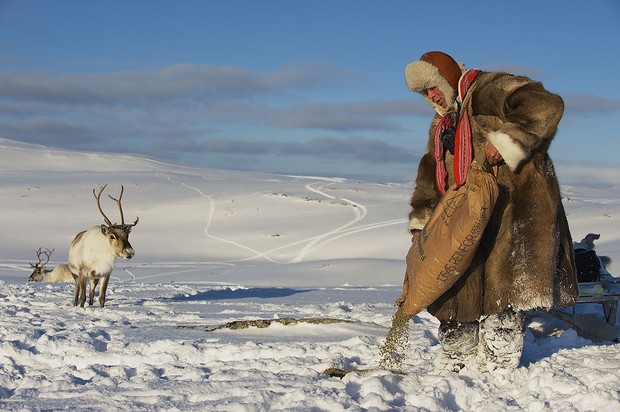
Lives and livelihoods at stake
The number of countries that have recognised the human right to a healthy environment in some way within their constitutions is now well over 100. That has led to more legal action and petitions to governments to take greater steps towards tackling climate change and related issues. That has been mushrooming all around the world, notes Prof Timo Koivurova at the University of Lapland.
Public awareness of climate change does appear to be growing. A 2021 YouGov poll in the UK suggested that 40 per cent of people would list climate change as being among the top three issues facing the country a proportion thats quadrupled in just three years.
This suggests that people increasingly have the will, and often the means, to take legal action in a bid to protect the environment. Not just because the environment is important, in and of itself, but also because our lives and livelihoods depend on it.
Its partly this idea, that humans cant do without a clean environment, that makes the protection of nature a human rights issue, explains Ben Schachter, human rights officer at the Office Of The United Nations High Commissioner For Human Rights (OHCHR). Clean water, breathable air, healthy ecosystems, a stable climate theyre not just nice things to have. Its very clear that without these things you cant enjoy other human rights, such as the rights to life, health, development, culture, says Schachter. Thats why we work on the area.
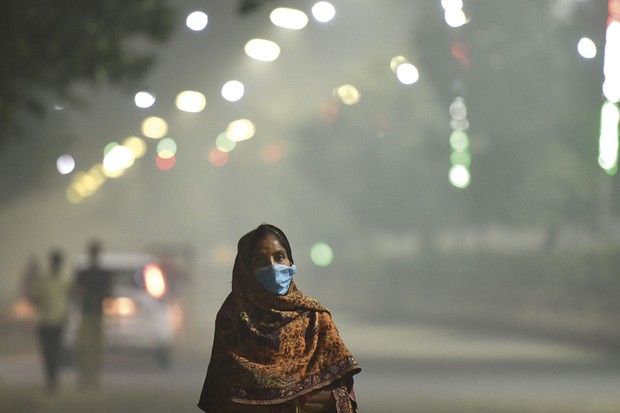
As an example, he notes that disasters related to climate change displace millions of people every year. This figure reached a record-breaking 55 million people in 2020, for example. And according to the World Health Organization, 4.2 million people die annually due to outdoor air pollution.
Schachter stresses that his and his departments role is not to lobby the Human Rights Council for specific action, though it does lobby other parts of the UN on certain issues. In general, the OHCHR is keen to advance the human right to a healthy environment. Schachter says that in 2022, the countries that drafted the Human Rights Council resolution will likely bring a similar resolution to the General Assembly, which is the main policy-making body within the UN.
If that resolution also passes, it will be yet another boost to those people around the world who are taking legal action to protect the environment, says Prof Susana Borrs Pentinat, a lecturer of public international law and international relations at Universitat Rovira i Virgili in Spain.
Legal action
Lawsuits of this kind arent new, and the concept of a human right to a clean environment is decades old, but legal action in this vein is now gathering greater attention. And becoming more ambitious.
In September 2020, six activists from Portugal (four children and two young adults) filed a case at the European Court Of Human Rights in Strasbourg. They demanded that a total of 33 countries (the member states of the European Union plus other countries including Russia and the UK) make greater cuts to their emissions in an effort to limit global warming to 1.5C above pre-industrial levels, or less, as stipulated by the Paris Climate Agreement.
At the time of writing, the case is still in motion, with the activists legal team due to respond by 9 February 2022, to defences submitted by the governments involved.
In 2019, a case at the Supreme Court in the Netherlands brought by Urgenda, a non-profit, resulted in a win for the campaigners. The court ruled that the Dutch state had to reduce its greenhouse gas emissions by 25 per cent by 2020 compared to 1990 levels. The court explained that its decision was partly based on the fact that climate change threatens human rights.
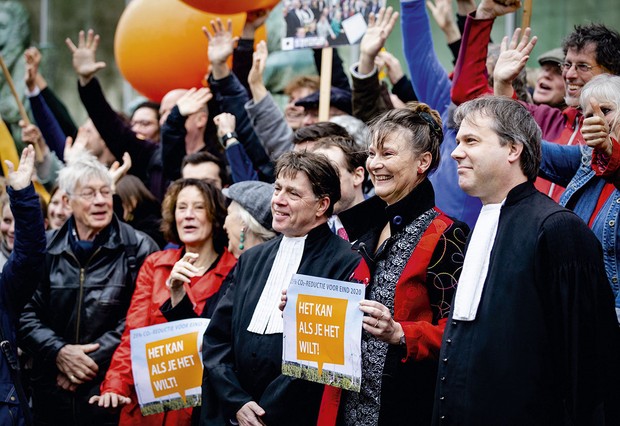
Legal efforts to safeguard the environment often rest on the application of rights of one kind or another. And that can have interesting outcomes. In 2018, Colombias Supreme Court famously granted rights of personhood to the Colombian part of the Amazon rainforest. Various rivers around the world, including in Canada and New Zealand, have also been granted personhood by judiciaries.
This is a completely new trend in giving nature its own rights, says Prof Malgosia Fitzmaurice from Queen Mary University of London. Its not anthropocentric anymore but its general and positioning human beings as part of nature, I think.
In principle, this shift allows lawyers to defend places and entities in the natural world using legal mechanisms that may previously have been applicable only to human beings. There is a problem, however. Lawsuits are not speedy things. Nor are they cheap.
Pentinat argues that environmental litigation nonetheless has an important role to play by pressuring those with the power to make significant changes that could slow climate change or cut pollution. At least its a way to raise awareness and highlight the responsibility of our states, she says.
Environmental litigation can take many forms, however. It can be broad, targeting the big-picture climate crisis, or more locally focused. A grassroots attempt to stop a company polluting a particular area, for example.
A global concern, a local issue
If a clean, healthy, safe and sustainable environment really is a human right then clearly it applies right around the world. This is important to think about because not everyone is affected by climate change equally, though were all affected by it in some way.
What do people who experience the worst effects of climate change, pollution, or biodiversity loss think about the possibility of asserting their legal right to a cleaner world? These issues are not simple, as pointed out by Nkkljrvi, referring to Saami reindeer herders.
On the one hand, changes associated with a warming climate are evident. Winters have become warmer, the weather is less stable and changes to vegetation mean that herders are having to supplement reindeer diets. As a result, traditional knowledge and language changes, says Nkkljrvi.
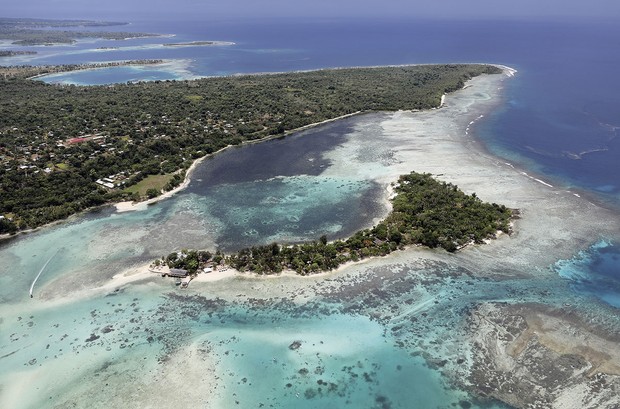
On the other hand, however, some reindeer herders view change and lost traditions as a natural development. Plus, some Saami people may be sceptical that human rights declarations and legislation at national and international levels will really serve them well.
The question is, will Saami needs be included in these aims and agreements, or do Saami have to adapt once again to meet the needs of the majority? asks Nkkljrvi.
In some cases, legal action may be geared towards establishing whats owed by wealthier, more polluting nations to smaller countries that are the worst affected by climate change. This appears to be a key motive behind Vanuatus plan to request an advisory opinion on climate change from the International Court of Justice.
The Pacific island nation, which is threatened by sea level rise and extreme weather, seeks to find out what the court has to say about the rights of its citizens to be protected from the effects of climate change in the future.
Settling on a solution
All civil legal action is, ultimately, about achieving a satisfactory decision or resolution to a problem. But its not always obvious that a lawsuit is the best way to do this.
In New Delhi, one of the most polluted cities in the world, opinions are divided as to how to clean up the air.
The choking smog is worst in the winter months, from around October till February, explains Khare. Vehicle pollution, dust from digging and construction work as well as the smoke emitted by fires burnt for warmth, or those lit to clear agricultural areas outside the city, all contribute to the problem.
We should have clean air, says Khare. Hes unsure, however, of how much public support there would be for claiming the right to clean air in the context of a legal case.
Others point out that there are many people involved in polluting industries or activities such as burning biomass in India who would stand to benefit from cleaner air, but who might also question whether their livelihoods would suffer if they had to change their ways.
And yet, the prospect of raising litigation to address these issues remains. A senior advocate in Indias Supreme Court is among those exploring a legal route towards tougher action on the sources of pollution, such as wood fires.
Anshuman Tiwari, a PhD candidate at the London School of Economics, argues that the language of human rights might be helpful when it comes to foregrounding some environmental issues, but perhaps not all. In India, he suggests the focus should instead be on providing incentives to move away from polluting activities.
The focus on health impacts is understandable, but what people miss is that all of north India could be growing much faster, he says. Based on research he has yet to publish, he argues that by reducing pollution perhaps by paying people not to burn materials that contribute to it the overall economic productivity of the country could rise by a few percentage points. Given Indias huge GDP of $2.6tr, that would represent a big divide.
Who benefits?
The advantage of taking a human rights-based approach to environmental protection, however, is in making sure that efforts to safeguard the natural world are of direct benefit to the people who suffer when its degraded, says Hindou Ibrahim, an environmental activist and geographer from Chad. Thats in contrast to a system in which a company or government is able to offset harmful activities by paying a carbon tax or supporting tree planting in some other location, after felling a patch of rainforest, for instance.
Her point is that this often doesnt directly benefit the people who used to live in the forest or who relied on its living ecosystem for food, medicine or shelter.
Ibrahim notes how extreme heat is already a problem in her home country of Chad, with temperatures often reaching 50C during the summer peak. Were the world to reach 2C or 3C of warming above pre-industrial levels, temperatures would soar even higher. Its going to be unliveable, she says, pointing out why a significant reduction in global emissions would be so meaningful for people at the frontline of climate change.
All the talk about climate change must be [from a] human-rights-based approach, she adds.
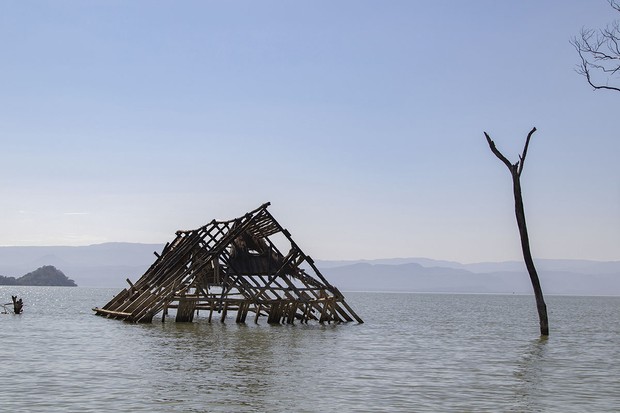
Nakalembe stresses how floods and landslides have become increasingly severe in countries such as Kenya and Uganda, making the lives of many people miserable. She has studied such impacts first-hand. Often, those affected by such disasters express deep frustration at having worked hard to establish a certain livelihood only to watch it literally get washed away a few years later, she says.
It just seems like they dont have a choice, they have to keep working in the field and hope that things will be okay, she explains.
In principle, human-rights-based legal action could help to redress this situation. And it could bring pressure to bear on many other issues from access to clean air to the protection of glaciers. The difficulty, perhaps, is making governments and industry truly accountable for these things via such action, notes Nakalembe.
But she adds that when people are informed that they do have a human right to a clean environment, and that there are mechanisms through which they can assert that right, then the possibility of doing something powerful emerges.
In 2022 and beyond, you can expect more lawsuits in this vein to spring up in local, national and international courts of law. Will that lead directly to solutions that solve the climate crisis and clean up the worlds pollutants? Well see. For now, the jury is still out.







